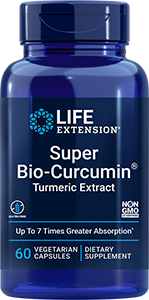| Two reports published in the March, 2008 issue of the Journal of Clinical Investigation provide evidence that curcumin, a polyphenol that occurs in the curry spice turmeric, may be protective against heart failure. The condition occurs when the heart cannot pump blood efficiently, and can lead to enlargement of the heart muscle (hypertrophy), along with symptoms such as swelling and fatigue. In the first study, Koji Hasegawa and his colleagues at Kyoto Medical Center in Japan administered oral curcumin for 7 weeks to rats with hypertensive heart disease, which normally leads to heart failure, and found that curcumin maintained systolic function and decreased left ventricular wall thickness. In a second experiment which involved administering oral curcumin beginning one week following surgically induced myocardial infarction (another model of heart failure), the rats experienced improved systolic function and a reduction in failure-induced increases in wall thickness and diameter of the noninfarcted myocardium after six weeks. The researchers attributed curcumin’s mechanism to inhibition of an enzyme known as p300 HAT (histone acetyltransferase). In the second report, Peter P. Liu of the University of Toronto and his colleagues describe the use of curcumin in mouse models of heart failure, as well as in cultured rat muscle cells and fibroblasts. In common with the first study, Dr Liu’s team found that curcumin prevented cardiac hypertrophy, and helped reverse it in the animals that received it, even when begun two weeks following induction of heart failure. Curcumin’s mechanism was also determined to be suppression of p300 HAT activity and its downstream signaling pathways. In an accompanying editorial, Jonathan A. Epstein of the University of Pennsylvania remarks that research involving curcumin has shown that the compound interferes with the activities of nuclear factor-kappa beta (NF-kB), cytochrome P450, and HIV reverse transcriptase, as well as the production of inflammatory cytokines, beta-amyloid accumulation, and p300 activity. Although he writes that the mechanism of action of curcumin in the heart remains unclear, Hasegawa et al conclude that they “believe that the present study will provide a novel therapeutic strategy for heart failure that targets a common nuclear pathway in cardiomyocytes.” | |  |  | | Congestive heart failure A number of conditions may lead to CHF, including: - CAD
- History of heart attack
- Advanced age
- Irregular heartbeats, or arrhythmias
- Heart valve disease
- Thyroid disease
- Diabetes
- Drug or alcohol abuse
- Cardiomyopathy
- Congenital heart defects
- Chronic high blood pressure
CHF that occurs on the right side of the heart is called cor pulmonale, or right-sided heart failure. It is characterized by an expanded right ventricle. Symptoms include swelling as the blood pools in the legs and lower body. CHF that occurs on the left side of the heart is characterized by an enlarged and weakened left ventricle. Left-sided heart failure may result in inadequate amounts of blood being pumped through the body and includes symptoms such as shortness of breath and fatigue. CHF can also be described by the phase of the heartbeat that is affected. A normal heartbeat has two phases: filling and contraction. The filling phase of the heartbeat, when the ventricles are relaxed and filling with blood, is called diastole. If the lower chambers of the heart, particularly the left ventricle, cannot fill properly, it is known as diastolic heart failure. Once the ventricles have filled with blood, they contract forcefully. This phase is called systole. If the heart cannot contract forcefully enough to expel the majority of the blood in the ventricles, it is called systolic heart failure. Systolic heart failure is the most common form of CHF. | Life Extension Magazine March, 2008 issue now online! 
Departments March, 2008 abstracts: Fucoxanthin, vitamin K, probiotics | |  | | Super Ubiquinol CoQ10   | | When it comes to choosing a CoQ10 supplement, the primary factor is how many swallowed milligrams actually make it into your bloodstream. Coenzyme Q10 is a notoriously difficult nutrient to absorb. A recent study showed that in seriously ill patients, conventional ubiquinone CoQ10 was hardly detectable in the blood, whereas the new ubiquinol resulted in significant blood level increases and subsequent clinical improvements. Scientific studies show that ubiquinol absorbs up to 8 times greater than ubiquinone and that higher levels of ubiquinol remain in the blood far longer than ubiquinone. In studies measuring exercise-induced fatigue, ubiquinol was 90% more effective than ubiquinone. In middle-aged mice, ubiquinol was shown to be 40% more effective in slowing measurements of aging compared to ubiquinone. Japanese researchers have developed a novel ubiquinol delivery system that has been shown to double-peak CoQ10 blood levels (i.e.,100% greater peak absorption) in mice compared to the original ubiquinol formula. This enhanced ubiquinol formula also achieved a 66% greater amount of CoQ10 in blood over 24 hours compared to the original formula. Life Extension has been issued an exclusive license to distribute this enhanced-absorbing ubiquinol. | | | Super Bio-Curcumin®   | | Curcumin was first used by Indians over 3000 years ago in traditional Ayurvedic medicine. Modern science has found that this extract from the common spice turmeric has remarkable qualities as an antioxidant. Over time, as our cells continue to be affected by free radicals, or oxidants, organs begin to degenerate and aging accelerates. The body has built-in defense mechanisms to protect itself from free radical damage, but eventually, aging depletes the body’s ability to keep oxidants at bay. Curcumin can also help maintain normal healthy platelet function and the normal process of bile excretion. New studies have tied inflammation to overexpression of a protein molecule called nuclear factor-kappa beta (NFkB). NFkB acts like a switch to turn on genes that produce the body's inflammatory responses. Because NFkB's expression increases in aging adults, scientists have sought ways to modulate NFkB and its effects in the body. Curcumin has been shown to exert powerful effects within the body. Curcumin inhibits overexpression of NFkB and acts on substances that activate NFkB. | | | |  | | Life Extension Update | | What's Hot | | Life Extension magazine | |

